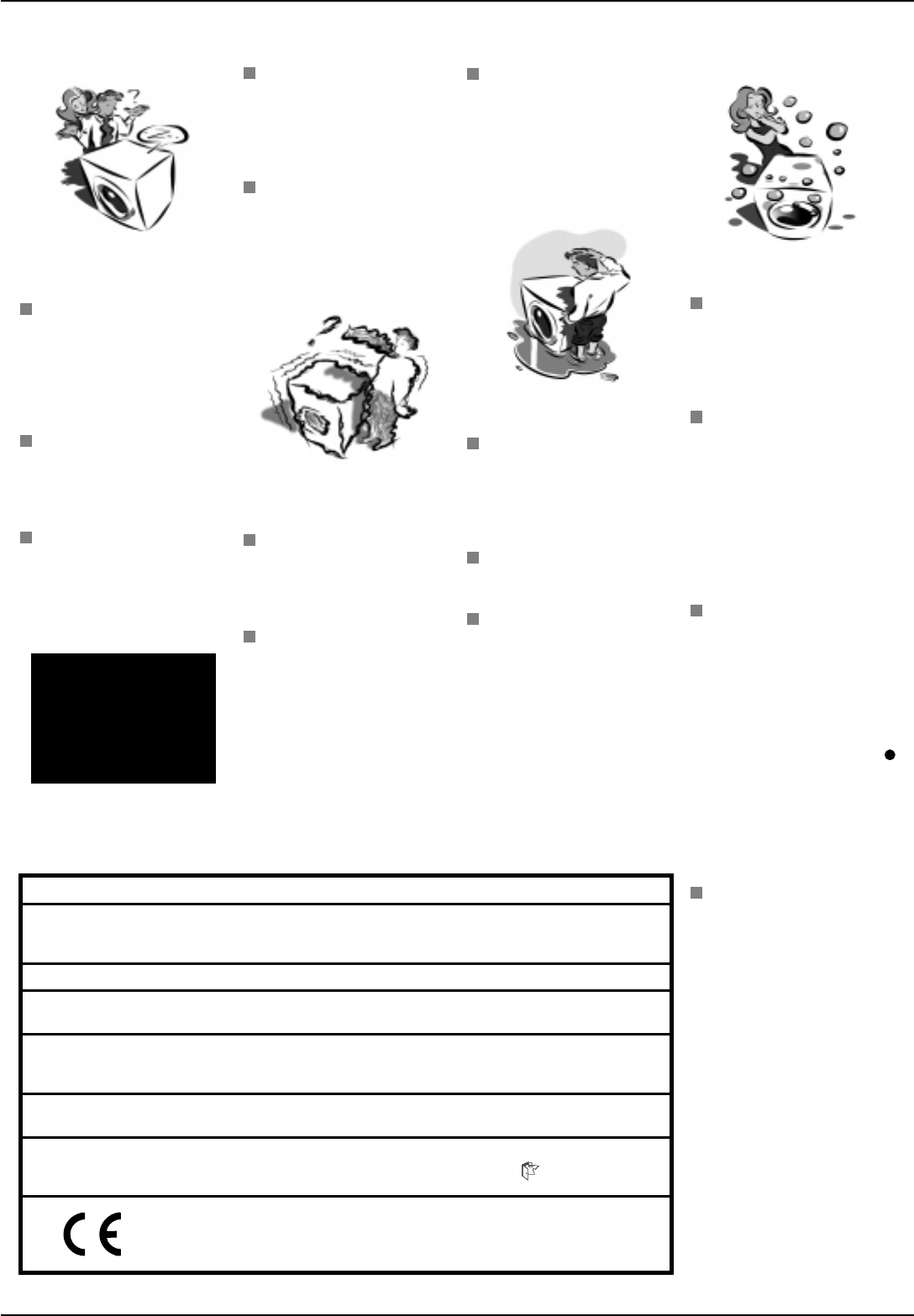
Model
WD 10
Dimensions
width 59,5 cm
height 85 cm
depth 53,5 cm
Capacity
from 1 to 5 kg for the wash programme; from 1 to 2,5 kg for the drying programme
Electrical
connections
voltage 230/240 Volt 50 Hz
maximum absorbed power 2050 W
Water connections
maximum pressure 1 MPa (10 bar)
minimum pressure 0,05 MPa (0,5 bar)
drum capacity 46 litre
Spinning speed
up to 1000 rpm
Control programs
in compliance with
IEC regulation 456
wash
: programme 3, temperature 60°C. Carried out with 5 kg load;
drying
: run with a load of 2.5 kg and knob
B
set to position .
This appliance conforms with the following E.E.C. directives:
- 73/23/EEC of 19/02/73 (Low Voltage) and subsequent modifications
- 89/336/EEC of 03/05/89 (Electromagnetic Compatibility) and subsequent
modifications
Too much foam.
Is the detergent appropriate
for machine washing? Check
whether the definition on its
label reads “for machine wash”
or “hand and machine wash”,
or any other similar wording.
Is the correct amount being
used? An excessive amount of
detergent, besides producing
too much foam, does not
guarantee a more effective
wash, and causes scaling in the
internal parts of the appliance.
The washer-dryer does
not dry.
Check whether:
the plug has been correctly
inserted into the socket; there
is electricity in your home; the
appliance door has been shut
properly; a delayed start (if
available) has not been
selected; programme knob A
has been set to position
(Stop/Reset); the drying cycle
knob B has been set to
position 0.
The washer-dryer doesn't
dry properly.
Check whether:
the end of the drain hose is
underwater; the drain pump is
obstructed; the advice given
on the maximum loads has
been taken; the water tap has
been turned on.
If, despite all checks, the washer-
dryer fails to function and the
problem persists, call your
nearest authorised Customer
Service Centre, providing the
following information:
- the nature of malfunction
- the model type no. (Mod. ....)
- the serial number (S/N ....)
This information can be found on
the data plate situated at the back
of the washer-dryer.
Is there space between the
machine and adjacent
units? If it is not a built-in
model, the washer-dryer will
oscillate a bit during the spin
cycle. A few cm of space
should therefore be left
around it.
The washer-dryer leaks.
Is the metal ring of the inlet
hose properly attached?
Turn off the water supply,
unplug the appliance and try
tightening its attachment
without forcing it.
Is the detergent dispenser
obstructed? Remove and
wash it under tap water.
Is the drain hose well
attached? Turn off the water
supply, unplug the appliance
and try tightening its
attachment.
Is the drain hose kinked?
The tract of the drain hose
must be as straight as
possible. Make sure the drain
hose is not squashed or
kinked.
Is the washer-dryer’s drain
duct clogged? Is there an
extension of the drain hose?
If so, is it positioned
incorrectly, blocking the
water flow?
Excessive vibration
during the spin cycle.
Have all transit screws been
removed durind instal-
lation? See the following
page on installation
procedures.
Has the washer-dryer been
levelled correctly? The
levelling of the appliance
should be checked
periodically. Adjust the feet
and check them with a level.
The washer-dryer does
not drain or spin.
Does the selected
programme incorporates
water draining? Some
programmes stop at the end
of the wash cycles and
draining will have to be
selected manually.
Is the “Anti-crease"
function -where provided -
enabled? This function
requires manual selection for
draining.
Is the drain pump clogged?
To check it, turn off the water
supply, unplug the washer-
dryer and follow the
instructions on page 13, or
call for technical assistance.
Technical characteristics
Always get
assistance from
authorised
technicians and
always insist on
original spare parts.
Instructions for installation and use
10


















